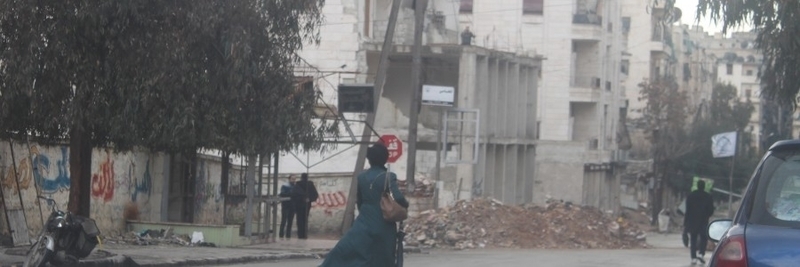On the afternoon of May 24, 2013, the weather was beautiful and the smell of the wonderful jasmine which grows in Damascus filled the air.
I stood there waiting for a shared taxi service to take me home. I saw the red license plates from afar and didn’t bother reading the sign on the car. I got in, ready for my short journey home.
The driver took a turn onto a road I’d never seen before. That’s when I noticed that I had got into the wrong kind of taxi. It was a different company, with a sign saying “Artoz” on the side window.
I laughed and I told myself it was all right, I’d have a little adventure and discover some new places. But I had no idea that these new areas would cause me such pain.
As we drove along, I looked out of the left-hand window to see a ghost city rolling by. This was Highway 40, which was under regime control. Rubble, destruction, entire buildings flattened. There was pain in the very sigh of the wind. It stirred up dust, and memories too.
“What’s this area called?” I asked the passenger seated beside me.
Surprised, he answered, “This is Moadamiya. Why, is this the first time you’ve taken this service?”
My throat tightened and my eyes immediately filled with tears, which were hidden by my dark sunglasses.
But I forced myself to smile in answer.
I continued to watch the city that I privately call my painful love.
My memories hurtled back to the evening of November 28, 2012.
An image of my mother loomed before me, clutching me to her chest and screaming, “Ahmad has been martyred! Your brother is dead!”
I cried silently, unable to scream. I went into my room and hugged my pillow as if it were my brother, shrieking with pain.
The screaming outside continued until I heard a voice cutting in, “He was hit by a shell in Moadamiya.”
Oh, Lord in heaven, my brother had been torn to shreds!
After that, I didn’t know whether I was crying for my brother’s soul or for his poor, shattered body.
“Please God, I want to hold him, to hold his body close, to kiss his head. Dear God, please, don’t let him be torn to pieces.” These are the prayers I remember saying.
Slowly, I turned my mind back to the moment we heard a knock on the door, my father opened it to greet my mother, my aunt and some friends, and my mother said, “Ahmad has been martyred!”
I had leapt up and stood by the door. My father’s tears streamed down – it was the first time I’d ever seen him cry – as he quickly muttered, “Praise be to God.”
An hour before the shell landed, my brother was finishing his German class at the language center in Mezze. He then left to do a shift at the hospital in Moadamiya. The neighborhood was in its second month under siege, and as a doctor, he felt it was his duty to help.
A few hours before, Ahmad had got his papers stamped at the foreign ministry. He was planning to go and complete his studies in Germany, but he hoped that the revolution might defeat the monster Bashar al-Assad before he left.
To this day, I have been unable to visit you in Moadamiya because of the continuing siege. I’m sorry, dear brother.
The monster is still alive, and we now have other monsters devouring us in new and terrible ways.
And yet for your sake, and for the sake of thousands like you, I swear we will remain here, steadfast.
We will remain.


